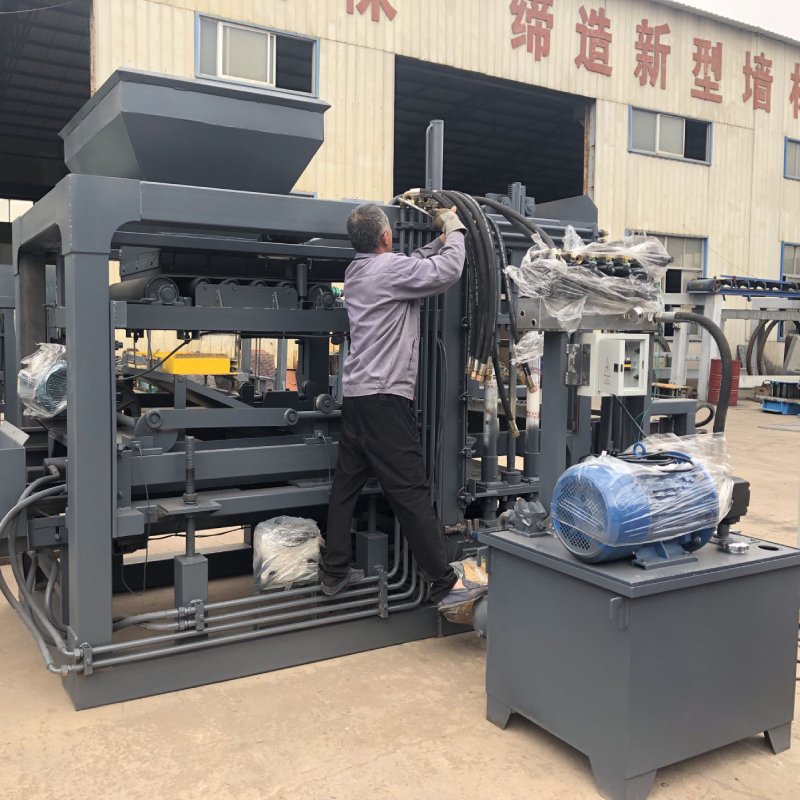
Image source :Aiweiblockmachine
Adopting Sustainable Water Management Practices in Block Manufacturing
Title: Sustainable Water Management in Block Manufacturing: A Path to Environmental Responsibility
Introduction
In the ever-evolving landscape of manufacturing, the pursuit of sustainability has become a defining characteristic of responsible business practices. In the realm of block manufacturing, where water is a crucial resource in the production process, adopting sustainable water management practices is not just a choice but a necessity. This article delves into the importance of sustainable water management in block manufacturing, the challenges associated with water usage in the industry, and innovative strategies for fostering environmental responsibility.
The Significance of Sustainable Water Management
1. Resource Conservation:
Water is a finite resource, and as concerns about global water scarcity continue to rise, industries must play a role in responsible water management. Sustainable practices in block manufacturing are essential to ensure the longevity of water resources for future generations.
2. Environmental Impact:
The extraction, processing, and utilization of water in manufacturing processes can have significant environmental implications. Effluent discharge, depletion of local water sources, and contamination are potential consequences of unsustainable water management practices.
3. Regulatory Compliance:
Governments and regulatory bodies are increasingly recognizing the environmental impact of industrial water usage. Compliance with stringent environmental regulations is not just a legal requirement but also contributes to a positive corporate image and social responsibility.
Challenges in Water Management for Block Manufacturing
1. Water Intensity of Production:
The production of concrete blocks involves a water-intensive process, from mixing the raw materials to curing the finished products. Balancing the need for water in the production process with sustainability goals presents a significant challenge.
2. Wastewater Treatment:
The treatment of wastewater generated in the manufacturing process is a complex task. Ensuring that discharged water meets environmental standards requires investment in advanced treatment technologies and ongoing monitoring.
3. Localized Water Scarcity:
Block manufacturing facilities are often situated in regions where water scarcity is a pressing issue. Balancing the water needs of production with the availability of local water resources requires a nuanced approach that considers the broader environmental context.
4. Energy Consumption:
Water management in manufacturing is closely tied to energy consumption. Treating and transporting water demand energy resources, contributing to carbon emissions. Achieving sustainability in water management involves addressing the energy-water nexus.
Innovative Sustainable Water Management Strategies
1. Water Recycling and Reuse:
Implementing systems for the collection, treatment, and reuse of water within the manufacturing process is a cornerstone of sustainable water management. By treating and recycling process water, block factories can significantly reduce their overall water consumption.
2. Rainwater Harvesting:
Harnessing rainwater for use in manufacturing processes is an eco-friendly approach. Rainwater harvesting systems can be integrated into factory infrastructure, providing a supplementary source of water and reducing reliance on local water supplies.
3. Smart Irrigation Practices:
If landscaping is part of the manufacturing facility, adopting smart irrigation practices is essential. Using sensor-based systems that respond to environmental conditions ensures efficient water use in landscaping, minimizing unnecessary water consumption.
4. Investment in Water-Efficient Technologies:
Upgrading machinery and processes to incorporate water-efficient technologies is a proactive step. High-efficiency equipment and production methods that require less water contribute to sustainable practices in block manufacturing.
5. Community Engagement and Education:
Engaging with the local community to raise awareness about water conservation is a powerful strategy. Involving employees, nearby residents, and stakeholders in sustainable water management initiatives fosters a sense of shared responsibility.
Benefits of Sustainable Water Management in Block Manufacturing
1. Resource Efficiency:
Sustainable water management practices enhance resource efficiency by reducing water consumption and optimizing processes. This not only conserves water but also minimizes the overall environmental footprint of the manufacturing facility.
2. Cost Savings:
Efficient water management translates to cost savings. By recycling and reusing water, block factories can decrease water acquisition and treatment costs, contributing to the financial sustainability of the business.
3. Regulatory Compliance and Reputation:
Adhering to environmental regulations and showcasing a commitment to sustainable practices enhances the reputation of block manufacturing facilities. Compliance with regulations and a focus on sustainability can attract environmentally conscious customers and partners.
4. Community and Stakeholder Relations:
Demonstrating a commitment to sustainable water management strengthens relationships with local communities and stakeholders. A proactive approach to environmental responsibility fosters goodwill and aligns the block manufacturing facility with community values.
Overcoming Challenges: A Holistic Approach
1. Technology Integration:
Embracing cutting-edge technologies is crucial for overcoming the challenges associated with water management. Advanced sensors, monitoring systems, and water treatment technologies enable a more nuanced and efficient approach to sustainable water use.
2. Collaboration with Experts:
Collaborating with environmental experts, water conservation organizations, and regulatory bodies can provide valuable insights and guidance. Industry collaborations and partnerships contribute to a shared pool of knowledge and resources.
3. Continuous Monitoring and Improvement:
Sustainable water management is an ongoing process that requires continuous monitoring and improvement. Regular assessments of water usage, treatment processes, and the environmental impact ensure that the facility remains aligned with sustainability goals.
4. Employee Training and Engagement:
The success of sustainable water management practices depends on the engagement and cooperation of the workforce. Employee training programs that focus on water conservation, efficient equipment operation, and waste reduction contribute to a culture of sustainability.
Conclusion
In conclusion, adopting sustainable water management practices in block manufacturing is not just an ethical choice; it’s a strategic imperative. As environmental concerns and regulatory pressures continue to shape the industrial landscape, block factories must proactively embrace sustainable water management to ensure their long-term viability and contribute to a more sustainable future.
By implementing innovative strategies, overcoming challenges, and fostering a culture of responsibility, block manufacturing facilities can lead the way in sustainable water management. Through these efforts, they not only minimize their environmental impact but also position themselves as industry leaders committed to the well-being of the planet and the communities they serve.
